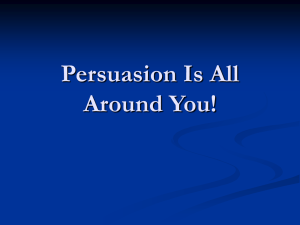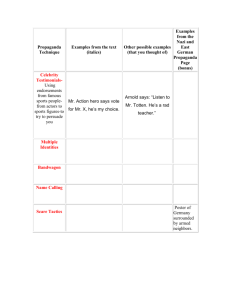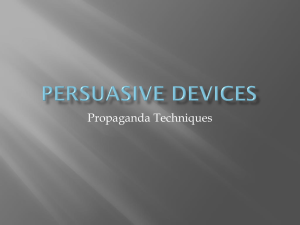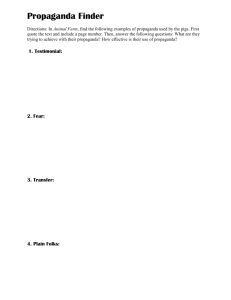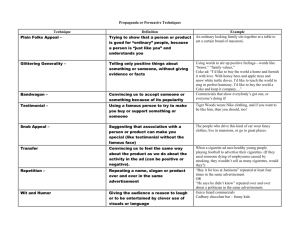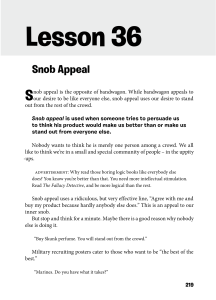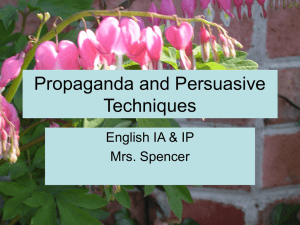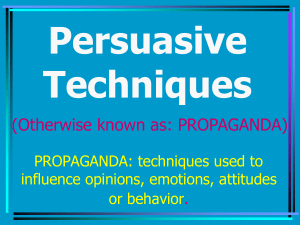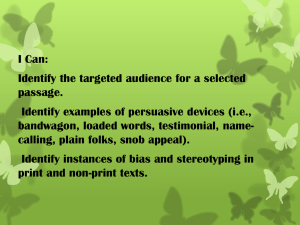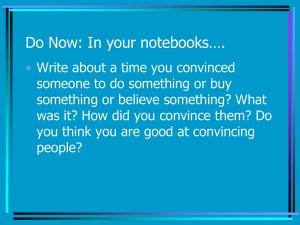Propoganda
advertisement
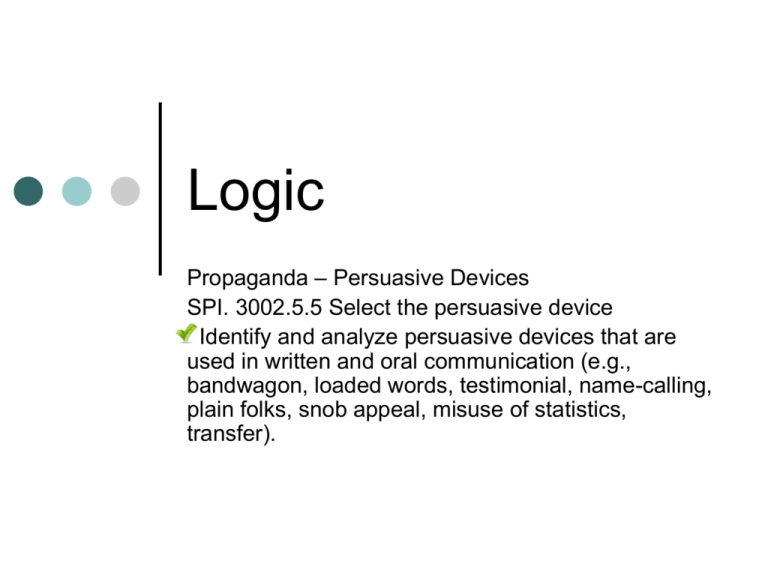
Logic Propaganda – Persuasive Devices SPI. 3002.5.5 Select the persuasive device Identify and analyze persuasive devices that are used in written and oral communication (e.g., bandwagon, loaded words, testimonial, name-calling, plain folks, snob appeal, misuse of statistics, transfer). Are you an unthinker? Rhetoric is the art of persuading someone. Unless you live as a hermit, totally isolated from people, rhetoric is a vital skill. Propaganda is a subset of rhetoric, in which they speaker/writer attempts to manipulate the audience with emotion or fallacious reasoning. Propaganda is commonly found in speeches and writings of politicians and lawyers, as well as in advertising. In other words, propaganda is commonly used by experts in convincing people. Because of propaganda’s appeal to emotion, use of fallacious reasoning, and appeal to membership in groups, propaganda appeals to an audience that is either irrational or unthinking (Standler, 2). Persuasive Devices Bandwagon Loaded words Testimonial Name-calling Plain folks Snob appeal Misuse of statistics Anecdotes Emotional appeal Transfer Bandwagon Do it because everyone else is – copycat. Loaded words strong emotional overtones or connotations, ... Loaded language is often used by news broadcasters as a propaganda technique Testimonial A famous person recommends a product. If they use it you should too. Name-calling – insults the competition Plain folk – appeals to the regular guy. – He is just like you wearing Wrangler. Snob appeal – appeals to the rich or wanna-be rich Misuse of statistics Skewing graphs and charts to fit their needs. This real estate graph from the New York Times has zoomed in on the area from 100-150 and magnified the growth in the last 15 years 2012 election fact checker Compare the statistics Emotional appeal Appealing to one’s emotions to sell a product or idea. Transfer Transfer is the process of getting you to feel the same way about the product that you feel about something else. Transfer clip Propaganda in History North Korea Israel Sower of Peace Politics!!!! Naziism – Joseph Goebbels reflects on the past year during World War II. He implies that the Nazis are innocent and concludes: Therefore in this hour as we bid farewell to a great year and enter a new one, the homeland greets the front. We greet soldiers in bunkers and the front lines, at airbases and in the navy. The homeland and the front join in a common greeting to the Führer. May a gracious fate keep him healthy and strong; then we will look with assurance into the future. Today more than ever he is Germany, the faith of our people, and the certainty of its future. We bow in honor before the great sacrifices of our people. The sacrifices of the past and those yet to come must not be in vain. We owe that to the Reich and its future. As we raise our hearts in grateful thanks to the Almighty, we ask his gracious protection in the coming year. We do not want to make it difficult for him to give us his blessing. We want to work and fight, and say with that Prussian General: “Lord, if you cannot help us or choose not to, we ask at least that you do not help our damned enemies!” Use these techniques in an advertisement In your groups you have will have 15 minutes to create an advertisement. You will be given a product to advertise with the persuasive device you need to use to persuade the reader to purchase your product. You may create a magazine advertisement with pictures and words or create a 30 second live action commercial. You may use anything in the room for this project. Be prepared to present your advertisement to the class. Each person must take on a role in the group. Read the instructions for the role you are assigned. I will be grading not only your success of the advertisement but also the way you carry out your personal role. Works Cited • http://www.rbs0.com/propaganda.pdf

